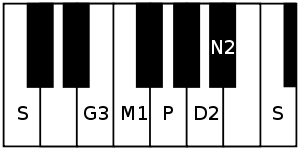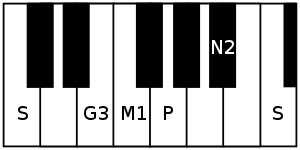Bahudari
Bahudari (pronounced bahudāri) is a rāgam in Carnatic music (musical scale of South Indian classical music). It is a derived scale (janya rāgam), as it does not have all the seven swaras (musical notes), derived from the 28th Melakarta raga Harikambhoji.[1]
| Arohanam | S G₃ M₁ P D₂ N₂ S |
|---|---|
| Avarohanam | S N₂ P M₁ G₃ S |
| Carnatic music |
|---|
Tanjavur-style Tambura |
| Concepts |
| Compositions |
| Instruments |
|
Structure and Lakshana


Bahudari is an asymmetric scale that does not contain rishabham. It is called a shadava-audava rāgam,[1][2] in Carnatic music classification (as it has 6 notes in ascending and 5 notes in descending scale). Its ārohaṇa-avarohaṇa structure is as follows (see swaras in Carnatic music for details on below notation and terms):
- ārohaṇa : S G₃ M₁ P D₂ N₂ S[lower-alpha 1]
- avarohaṇa : S N₂ P M₁ G₃ S[lower-alpha 2]
This scale uses the notes shadjam, antara gandharam, shuddha madhyamam, panchamam, chathusruthi dhaivatham and kaisiki nishadam.[1][2]
Popular compositions
Bahudari is a melodious rāgam.[1] Here are some popular compositions in Bahudari.
- Brova baaramma composed by Thyagaraja
- Marakoti sundari and Unnadiye gatiyendru by G. N. Balasubramaniam
- Sadananda tandavam seyyum by Achutadasar
- Bhaja Manasa vighneswaram composed by Thulaseevanam
- Sinamadaiyade Seerividade composed by Dandapani Desikar
- Sakala Shanti Karamu Sarvesha - tuned by Mahavidwan Sri Nedunuri Krishnamurty composed by Annamacharya
- ' Kamaladalayatha lochana ' by Dr M. Balamuralikrishna.
- Mahâ Venkateshwarâ by Kalyani Varadarajan[3]
- Irabeku by Purandaradasa
Notes
- Alternate notations:
- Hindustani: S G M P D Ṉ S
- Western: C E F G A B♭ C
- Alternate notations:
- Hindustani: S Ṉ P M G S
- Western: C B♭ G F E C
References
- Ragas in Carnatic music by Dr. S. Bhagyalekshmy, Pub. 1990, CBH Publications
- Raganidhi by P. Subba Rao, Pub. 1964, The Music Academy of Madras
- Krishnan Rajendram, Maha Venkateshwara by R Suryaprakash - Bahudari ragam Composition of Kalyani Varadarajan, retrieved 2019-01-20